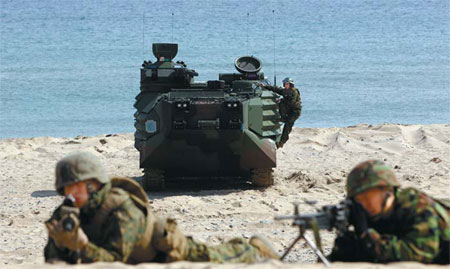China reaffirms commitment to stability on Korean Peninsula
 0 Comment(s)
0 Comment(s) Print
Print E-mail China Daily, March 30, 2012
E-mail China Daily, March 30, 2012
China on Thursday reiterated that it serves the common interests of all parties involved in safeguarding the peace and stability of the Korean Peninsula and Northeast Asia, and in maintaining momentum to improve relations between the Democratic People's Republic of Korea and the United States.
 |
|
A US Marine and a Republic of Korea soldier aim their machine guns to guard a US Marine's amphibious assault vehicle after a landing operation during the joint US-ROK military exercises south of Seoul on Thursday. [China Daily] |
"The Chinese side thinks highly of the consensus reached by the DPRK and the US on Feb 29, and supports them to keep improving relations through dialogue. We hope all parties will work together to contribute to the peace and stability of the Korean Peninsula and Northeast Asia," Foreign Ministry spokesman Hong Lei said at a regular news briefing.
Hong's comments came after the US announced on Wednesday that it would suspend its planned nutritional food aid to the DPRK over the latter's insistence on a planned satellite launch.
"It reflects their lack of desire to follow through on their international commitments, so we have been forced to suspend our activities to provide nutritional assistance to the DPRK," Peter Lavoy, acting assistant secretary of defense for Asian and Pacific security affairs, said at a US congressional hearing.
The Pentagon official's comments marked a tougher stance and made clear that plans to deliver aid had already been scrapped, said AFP.
International Atomic Energy Agency spokeswoman Gill Tudor confirmed on Thursday that the agency was still in talks with the DPRK about a possible visit by inspectors.
"Consultations are ongoing," she said. "There is no decision on the visit, including on whether (IAEA head Yukiya Amamo) will visit or not."
Speaking through the Korean Central News Agency, the official media, the DPRK said on Wednesday that the satellite launch is intended to help estimate crop production and analyze the country's natural resources, according to Xinhua.
The 100-kilogram Kwangmyongsong-3 satellite is scheduled to be launched between April 12 and 16 to celebrate the centenary of the birth of Kim Il-sung, founding father of the DPRK.
The KCNA quoted an unnamed deputy director of the Space Development Department of the Korean Committee for Space Technology, who said the DPRK government will demonstrate to the world "the peaceful nature" of its planned satellite launch.
The deputy director also added that the DPRK would invite foreign experts and journalists to witness the launch at the Sohae Satellite Launching Station, as well as the preparation site in the General Launch Command Center.
The Republic of Korea, China and Japan will hold talks in Ningbo, in East China's Zhejiang province, next month on regional security and cooperation, and the rocket plan is certain to be discussed on the sidelines, ROK Foreign Ministry said on Thursday.
Yuan Peng, director of the Institute of American Studies at the China Institutes of Contemporary International Relations, said the satellite plan of the DPRK was at the red line of a UN resolution that forbids the country from conducting any experiments related to a missile launch, and it was also testing the willingness of the US to work with it on easing tension on the peninsula.
"Now the cut in food aid has proved to the DPRK that the agreement between the two sides not long ago was just a strategic choice by the US," he added.
Under an agreement reached on Feb 29, the DPRK said it would suspend uranium enrichment, nuclear and long-range missile activities and allow UN inspectors to return to the country.
In return, the US agreed to provide the DPRK with 240,000 tons of nutritional assistance. The two sides met earlier this month in Beijing to discuss details of the aid.
At a meeting on Monday with US President Barack Obama during the Nuclear Security Summit in Seoul, President Hu Jintao said China hoped the US and the DPRK would continue their dialogue and honor the recent consensus.
The US actually has two sets of DPRK policy - one is DPRK nuclear policy and the other is DPRK leadership change, he said.
To achieve a nuclear-free peninsula, the US shouldn't correlate its denuclearization efforts with its leadership change, he added.
Yuan also noted that the US decision was also due to its allies' interests in the region, especially Seoul and Tokyo, as well as domestic criticism from the Republicans over a soft DPRK policy.






Go to Forum >>0 Comment(s)